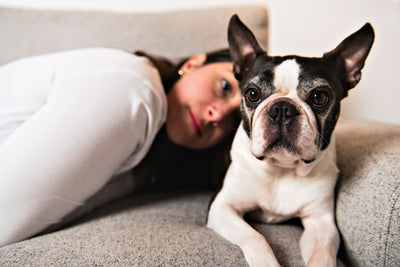One of the most common reasons that pet parents bring their dogs to the vet is for ear infections. They are painful and itchy for the pup, annoying for the human. Scratching, head-shaking, icky discharge, bad odor, red swollen ears – all can be signs of an infection. Keeping those ears clean is the best preventative step to take. But did you know that certain breeds of dogs are more prone to ear infections than others?

It makes sense that the dogs with adorable, big floppy ears are on the list. Those long ears can trap heat, moisture and debris inside, which is a lovely breeding ground for bacteria. So breeds like Basset Hounds, Beagles and Golden Retrievers can be more susceptible.
Very hairy ears can help lead to infection too, simply because if debris, dirt and bacteria make it past all that hair, it can end up staying there, held in place by all that fluff – and the inside of those ears can be harder for pet parents to see and clean. We’re looking at you, Labradoodles, Cocker Spaniels and Poodles!
Those water-loving doggos can be asking for ear trouble too. If you have a pup who loves to swim and play in the water (hello, Labradors!) make sure to clean your dog's ears and dry them after every watery adventure.
It’s not just about the shape of the ear or the penchant for water aerobics. Bulldogs, Shar-Peis and other dogs known for their heavy skin folds often have very narrow ear canals. That means that even a small amount of debris can get clogged in there and cause discomfort. Plus bacteria and dirt can get lodged in their skin folds on the rest of their body, so it is super important to keep them clean.
Dogs who tend to have allergies are at higher risk of developing ear infections. Pit bulls are a breed that are prone to allergies and skin conditions which can lead to ear issues. Ear infections are often a secondary symptom of underlying allergies, especially allergies to dust, mites, molds and pollen. Allergies can cause the skin barrier to break down and increase the production of wax in the ear canal. This allows the low number of normal yeast and bacteria on the skin and in the ear to overproduce and allow more severe strains of bacteria to thrive.
So what’s a floppy, hairy-eared water-loving-allergy-sensitive dog parent to do? Check those ears frequently – it’s a great excuse for an ear rub and some bonding time. Avoid environments or foods that can cause allergic reactions, limit the amount of time spent in water, and most importantly, keep those ears clean. Handy wipes like Silver Honey® Vet Strength Pet Wipes not only help maintain cleanliness simply and easily, but fight bacteria for happy, healthy ears.
And be ready for your furry friend to show up like a Ninja the next time they hear that food wrapper from three rooms away.





